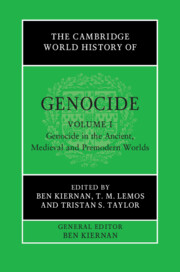Book contents
- The Cambridge World History of Genocide
- The Cambridge World History of Genocide
- The Cambridge World History of Genocide
- Copyright page
- Contents
- Figures
- Maps
- Tables
- Contributors to Volume I
- General Editor’s Acknowledgements
- General Editor’s Introduction to the Series
- Introduction to Volume I
- Part I Themes of Genocide through History
- 1 Genocide before the State?
- 2 The Religion–Genocide Nexus
- 3 Genocide and Gender
- 4 Genocide, Starvation and Famine
- 5 Climate, Violence and Ethnic Conflict in the Ancient World
- Part II The Ancient World
- Part III The Medieval World and Early Imperial Expansions
- Index
3 - Genocide and Gender
Dynamics and Consequences
from Part I - Themes of Genocide through History
Published online by Cambridge University Press: 23 June 2023
- The Cambridge World History of Genocide
- The Cambridge World History of Genocide
- The Cambridge World History of Genocide
- Copyright page
- Contents
- Figures
- Maps
- Tables
- Contributors to Volume I
- General Editor’s Acknowledgements
- General Editor’s Introduction to the Series
- Introduction to Volume I
- Part I Themes of Genocide through History
- 1 Genocide before the State?
- 2 The Religion–Genocide Nexus
- 3 Genocide and Gender
- 4 Genocide, Starvation and Famine
- 5 Climate, Violence and Ethnic Conflict in the Ancient World
- Part II The Ancient World
- Part III The Medieval World and Early Imperial Expansions
- Index
Summary
The chapter explores the workings of gender in genocidal processes. It frames the subject inclusively, to address women and men; masculinities and femininities; the specific vulnerabilities of LGBT people; survivor, victim and perpetrator experiences; and structural and institutional forms of sexualized violence alongside event-specific ones. The chapter encourages readers to rethink major categories of analysis and themes in genocide studies as gendered phenomena.
Although pervasive, gender is often overlooked for its role in how genocide is conceived, performed, and experienced. The chapter traces its influence in connection to other explanatory narratives and theories such as the roles of the state, militarism, war, imperialism, racism, and sexism. Was gender one of many facets or a primary force in escalating or de-escalating the violence over time and space? Variables of race and ethnicity, themselves typically intersecting with social class, crucially shape how gender identities are imposed, interpreted, and experienced. The interaction of gender with an age variable is also noted. The coverage spans case studies of genocide in Europe, Asia, the Americas and Africa in order to illuminate the universal and particular. The authors also present on the role of courts in prosecuting mass rape and sexual violence as acts of genocide. The conclusion points out key intellectual, ethical and policy challenges ahead.
- Type
- Chapter
- Information
- The Cambridge World History of Genocide , pp. 103 - 126Publisher: Cambridge University PressPrint publication year: 2023

